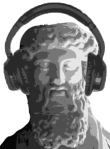Podcast review: Econtalk February 22, 2009
Posted by Sverre in : Political economy, Reviews , trackback In my quest to find good political science podcasts out there, I’ve now arrvied at the Library of Liberty and Economics‘ podcast series “Econtalk“. Like the previously reviewed LSE lectures, it’s a well established line with a lot of material from interesting speakers. There’s a lot of good material in there, although the style differs much from the lecture style of the LSE cast.
In my quest to find good political science podcasts out there, I’ve now arrvied at the Library of Liberty and Economics‘ podcast series “Econtalk“. Like the previously reviewed LSE lectures, it’s a well established line with a lot of material from interesting speakers. There’s a lot of good material in there, although the style differs much from the lecture style of the LSE cast.
Econtalk is, like its name implies, talking on economics and related spheres – mostly political economy. If you regard the more policy-related parts of economics as being within the interest sphere of political science, there is an abundance of good material here.
By looking up Browse Archives|By category in the left hand menu you can see only those categorized as “political science”, although this seems very narrowly defined. I picked three broadcasts and listened to them a couple of times to make up my opinion. The three were:
- “Acemoglu on the Financial Crisis“
- “Coyne on exporting democracy after war“
- “Weingast on Violence, Power and a Theory of nearly everything.“
The style of the Econtalk series is quite different from the LSE series. These are not recordings of lectures, but radio-style broadcasts made for podcasting. At least all the three I listened appear to be studio-recorded interviews with scientists, some of them being conducted over the phone or otherwise from some remote location. The posting schedule seems to be quite consistently once per week.
The technical quality of the broadcasts is very good, as is to be expected to studio recordings as opposed to lecture halls. There’s no distracting noise (except for telephone voice, but that’s something I can live with) or other things making the broadcasts hard to follow, as was the case with the LSE recordings. This is all in good radio quality as you’d expect from a professional radio station. All the broadcasts appear to be audio only.
The interviews are conducted by Russ Roberts, professor of Economics at George Mason. He’s clearly an economist and not a political scientist, but he is one of those apparently open-minded economists that have a bit broader outlook than only formal models. I’d like to classify him as a proper political economist. Like the great majority of modern day economists he’s clearly very much a neo-liberalist, not very surprising considering the publisher. This clearly also influences both the selection of interview subjects and the questions asked. I occasionally get the idea that he deliberately tries to trick his interviewees into confirming that classical neo-liberal ideas are the logical conclusion of their theories. At other times, however, he comes across as quite moderate in reevaluating these conceptions, as for example in the Acemoglu interview regarding the faults of modern economics.
I could say a lot about the interview format. On the one hand, there is much space for the scientists to express themselves, on the other hand Roberts clearly “leads the witness” in his talks, steering them in the direction he wants the conversation to go. This is both a good thing and a bad. Occasionally it appears he goes a bit too far in offering his own explanations of the theories presented rather than letting the authors themselves explain. On the other hand, he is able to control things and make the conversation stay on topic in a way you can’t in a recorded public lecture. Still – this has been done with great success on radio for decades, and this is in just that style. It works, but not with the same unpredictability you get from recorded lectures, especially with a Q&A session.
The three broadcasts I listened to were all interviews with authors of recent books that present interesing theories of political economy. Two of them (Weingast and Coyne) are related to the development of democracy, while the third (Acemoglu) deals with new explanations of the finance crisis. They are all very interesting, dealing with new ideas and explanations that make sense. The interviewees are all people who can explain things simply enough to be interesting, yet presenting cutting edge scientific theories. Prof. Roberts also asks insightful questions and help clarify along the way.
What makes the whole thing less interesting, is that there is no opposition or confrontation at any point. This is all conversation without the slightest hint of “difficult” questions or trying to challenge the theories put forward. I’d love to see Prof. Roberts challenging his subjects further, putting their theories a bit more to the test.
So, to sum things up in short: I’ll warmly recommend this podcast, but I miss the academic spirit of critical examination of the theories presented. This could have raised them from good to great. The good technical quality is a big plus.
Comments
Sorry comments are closed for this entry